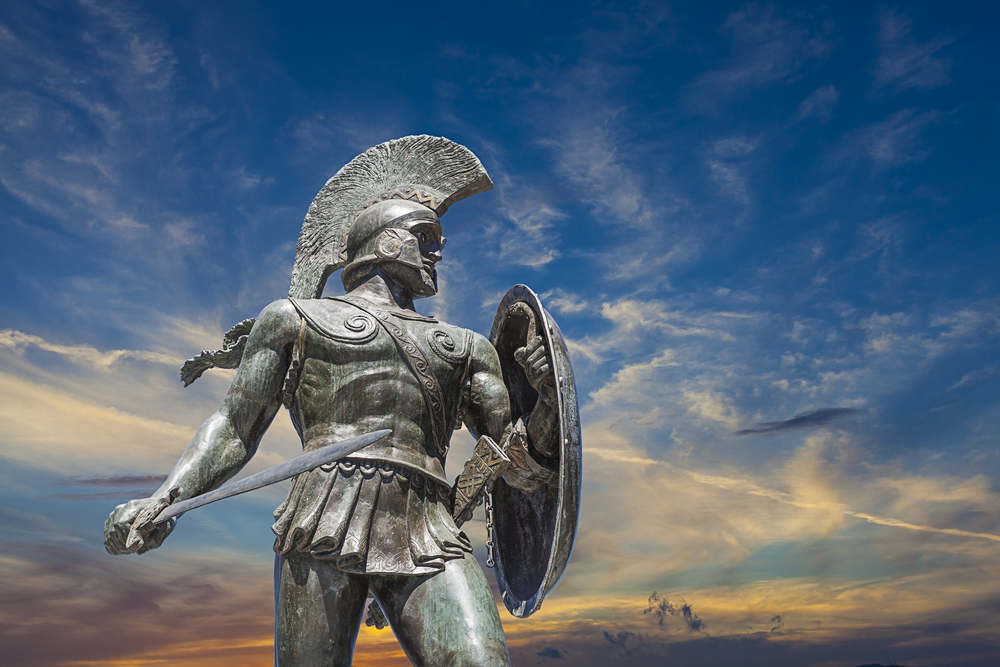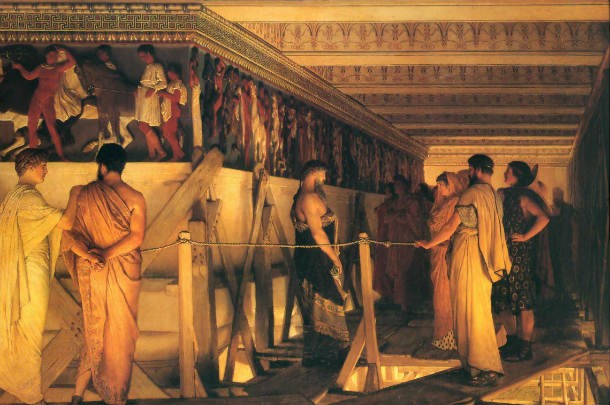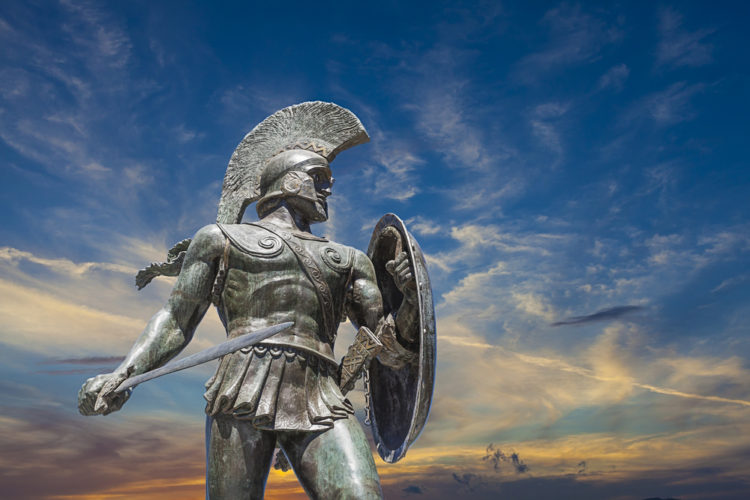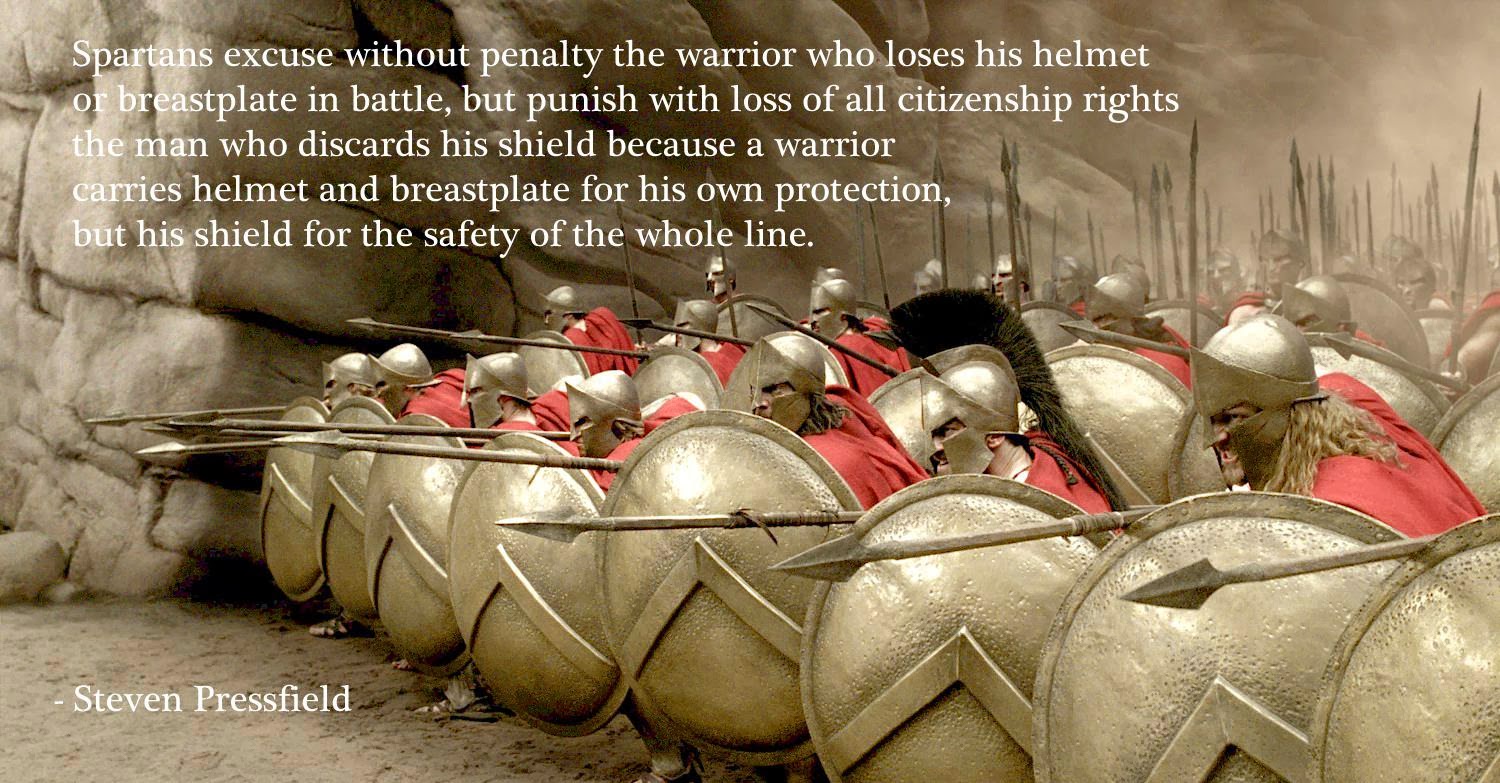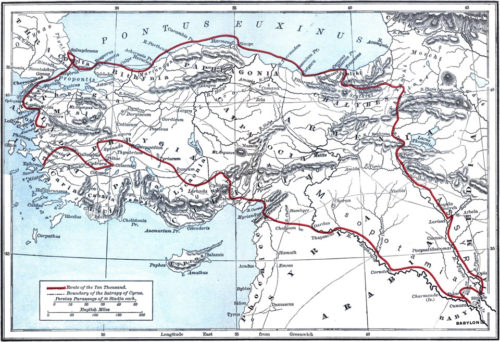The Peloponnesian War by Thucydides
The writer Thucydides, an Athenian, wrote about the three decades long war that left Athens in shambles and Sparta the stronger for it. The Greek world was turned around by the Peloponnesian War. Athens, once the strongest city-state prior to her war with Sparta, was weakened and Sparta emerged victorious. After the victory of the united Greek forces against the Persian Empire, the two dominant city-states of Greece, Athens and Sparta, fought each other and this led to the Peloponnesian War that destroyed whole cities and marked the dramatic end to the fifth century BCE and the golden age of Greece.
In his book, Thucydides attempted to present an objective point of view. He wrote: “Of the events of war I have not ventured to speak from any chance information, nor according to any notion of my own; I have described nothing but what I either saw myself or learned from others, of whom I made the most careful and particular inquiry.”
Thucydides was an Athenian general who desired accuracy in recounting the story and would not pepper the material with myth and romance as some historians are sometimes wont to do. In fact we get the word hyperbole from ancient Greek. How interesting that we also get the word ‘laconic’ from that region as well.
It is to our gain that Thucydides was a good observer and kept to the facts. We’re able to understand how after the Greco-Persian wars Athens grew in power. As that war ended, and Athens became an empire, it became a threat to the Peloponnesian states, including Sparta. Sparta would turn on its former ally and through their long wars the Greek world would be changed forever. Athens would lose, and though Sparta was the victor, her power and influence would eventually wane. The Greeks certainly understood story-telling and myth-making. Stories are told differently throughout various cultures. In this book, we get, “just the facts maam”. Anyone who can devote the time to read a good book will find this book to be a magnetic read.
On Sparta by Plutarch
“Come back with your shield – or on it” was supposed to be the parting cry of mothers to their sons. Mothers whose sons died in battle openly rejoiced, mothers whose sons survived hung their heads in shame”-Plutarch. Such asn interesting quote from Plutarch.
20 years after reading this book I can still recall many selections from its pages. This book is an absorbing read. Plutarch, the essayist, biographer and historian, wrote about the Spartans in such a way that any reader will be deeply occupied in trying to picture the various aspects of the culture he described.
“In the case of another boy, when the time had arrived during which it was the custom for the free boys to steal whatever they could, and it was a disgrace not to escape being found out, when the boys with him had stolen a young fox alive, and given it to him to keep, and those who had lost the fox came in search for it, the boy happened to have slipped the fox under his garment. The beast, however, became savage and ate through his side to the vitals; but the boy did not move or cry out, so as to avoid being exposed, and left, when they had departed, the boys saw what had happened, and blamed him, saying that it would have been better to let the fox be seen than to hide it even unto death; but the boy said, “Not so, but better to die without yielding to the pain than through being detected because of weakness of spirit to gain a life to be lived in disgrace.”
We cannot be sure what is all true because Plutarch lived centuries after the Spartans expired. But we know well enough today, there are men as tough and laconic as the Spartans. True, many of their customs disappeared with them but enough survives today that we marvel at their self-discipline.
Plutarch crafted something very appealing. Through his writings we learn much about the Spartan social system and constitution. We learn about their inhabitants and the strict discipline they subjected their citizens to, and thousands of years later we still admire their stern culture. A very entertaining and informative book to read.
The Odyssey
The Odyssey has been translated by many authors. Some people may have preference for one author over another. I particularly like the version give to us by T.E. Lawrence. Lawrence never believed he could do as well of a job as Homer, and he asked for two years to translate it. But it took him four years. He sometimes spent hours trying to perfect a single line. Lawrence learned Greek in school and read Greek comedies for relaxation during breaks in the war and battles he was busy fighting.
Lawrence offered the public something unique in that he attempted in his English translation to offer both the spirit and the narrative of the Greek original. Publisher Bruce Rogers wrote: ‘Here, at last, was a man who could make Homer live again – a man of action who was also a scholar and who could write swift and graphic English.
The Odyssey is about our Greek hero Odysseus and his journey home after the fall of Troy. The 1955 Kirk Douglas movie Ulysses is simply the best, 40 years later, and is a good preparation for getting into the spirit and guts of the book.
Odysseus spent 10 years fighting in the Trojan War, and he will spend another ten years attempting to get home. His wife assumed that he died. His faithful son must deal with dishonorable suitors who have lowly intentions for marrying his mother and assuming control of his estate. When Odysseus gets home to his wife Penelope, it will not be well for those who would attempt to possess his home, his wife, and his wealth. Even as we know the end of the book, it is still an irresistible read. Odysseus/Ulysses is a survivalist of the highest order.
Gates of Fire: An Epic Novel of the Battle of Thermopylae by Stephen Pressfield
Frank Miller’s comic book the 300 opened up another generation’s eyes to the story of the Spartans. And Zack Snyder’s visceral movie did the same. Though they are historically inaccurate, the spirit of their work, continues on in the hearts of young men. History books once seemed only for the classroom and for history teachers. But today, young boys and men pore through these ancient historic works in order to grasp at what built Spartan strength. How did a small Spartan army hold off a massive invasion coming from Greece? How did men so willingly stand up for their nation and willingly die for their nation? King Leonidas surely knows their fate. Only the best of them are selected. Pressfield get’s men interested in the Spartans.
From Plutarch, Sayings of Kings and Commanders we get:
“When Paedaretus was not chosen to be one of the Three Hundred, an honor which ranked highest in the State, he departed cheerful and smiling, with the remark that he was glad if the State possessed three hundred citizens who were better than himself.”
This book is not from the ancients but is a great book to read from Stephen Pressfield. This story grabs the reader from the start and keeps going. It is an excellent work of historic fiction. The book introduces readers to the people, the events, and the strategies that led up to the battle at Thermopylae. The mighty Spartans would go into a three-day battle to hold of the pass at Thermopylae (the Hot Gates). They know they will not survive. They know there will be no further tomorrows, and yet they stood strong. The Spartans at the Hot Gates will demonstrate incredible courage, patriotism and in the end sacrifice themselves willingly. This is a good read for a young man, and an excellent re-read for those who have already been inspired to stand up strong.
The Iliad by Homer
Perhaps all young boys and men have been inspired to become warriors after reading just portions from this book, the Iliad. My first exposure to it was in the 8th grade and after reading it, for months all I drew were pictures of men with shields and swords, in my notebook. The Iliad story has been in schools for a very long time and has inspired men to greatness such as Churchill, and T.E. Lawrence.
Lawrence in fact, so enamored with Homer, translated the Odyssey and his version is found online. The Iliad is set during the Trojan War. Much is written about the siege of Troy and the characters are covered substantially enough that we get a good sense of who they are. The epic mentions the build-up of warriors gathering for the war, how the decade long war was caused, and then the sacking of Troy. Perhaps you’re familiar with the Wolfgang Peterson movie called Troy. If you were entertained by the movie, then the book will most certainly give you a deeper view into the world of Agamemnon, Achilles, and the lead up to the war. Achilles will have his day here, but so too will others; but at the end of the Iliad it doesn’t end well for anyone. They will all die. Thousands of years hence, all of them will live on in legend.
The Persian Expedition: Anabasis by Xenophon
Okay, who knows this trivia? In the Anabasis, Xenophon must travel with his men to safety after being trapped behind enemy lines. What is that place now called? Yup, you got it right, Iraq. How about this one: Who knew the 1979 American cult film ‘Warriors’ directed by Walter Hill was based on this 400 BC event? Yup.
Thalatta! Thallata! The Sea! The Sea!
In the book, a young Athenian noble named Xenophon gives an eyewitness account of the attempt by the Ten Thousand, (a Greek mercenary army), to help Prince Cyrus overthrow his brother in order to steal the throne. The Ten Thousand (Ancient Greek: οἱ Μύριοι) were mercenary units, mainly Greek, employed by Cyrus the Younger to attempt to wrest the throne of the Persian Empire from his brother, Artaxerxes II. Their march to the Battle of Cunaxa and back to Greece (401–399 BC) was recorded by Xenophon (one of their leaders) in his work The Anabasis.But things do not go well.
Cyrus is killed and now the Greeks are without a patron or an employer. They are also without leadership for their Greek general and the rest of the higher leadership has been killed. The mercenaries have been betrayed. What are the options?
Xenophon encourages the ten thousand to flee through hundreds of miles of hard terrain. Every part of the story is interesting, such as when Xenophon must use diplomacy or warfare to obtain supplies for his men, even as their way is barred and their enemies are barreling down upon them. Xenophon uses strategy to traverse indirect routes, or travels directly through territories if he must. He has a serious plan, something all good leaders should have, and this will allow the men to survive. A good book on the matters of betrayal, success, leadership, controlling your forces, making ad hoc decisions, and doing nothing frivolous.
*The views and opinions expressed on this website are solely those of the original authors and contributors. These views and opinions do not necessarily represent those of Spotter Up Magazine, the administrative staff, and/or any/all contributors to this site.

